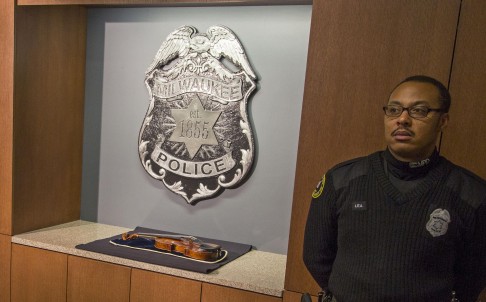Alleged mastermind of US$5 million Stradivarius theft pleads guilty
PUBLISHED : Sunday, 05 October, 2014, 6:08am
UPDATED : Sunday, 05 October, 2014, 6:08am
Associated Press in Milwaukee, US

A policeman guards the rare violin in Milwaukee. Photo: AFP
A man accused of masterminding the theft of a US$5 million Stradivarius violin has pleaded guilty to robbery, nearly eight months after the 300-year-old instrument was snatched from a musician who was attacked with a stun gun following a performance in the US Midwest.
Salah Salahadyn, 42, was taken into custody after changing his plea during a hearing on Friday in a local court. He could face more than a decade in prison when sentenced November 10.
The violin was missing for nine days before police found it in a suitcase at the Milwaukee, Wisconsin, home of Salahadyn's acquaintances. Police said the homeowner did not know what was in the suitcase in his attic.
Court documents say Salahadyn told an acquaintance that such a robbery would be his dream crime because of the instrument's value and the ease of grabbing it from a musician walking down the street.
It was not his first involvement in such a crime. He pleaded guilty in 2000 to trying to resell a US$25,000 statue to the art-gallery owner from whom it had been stolen in 1995. His ex-girlfriend told investigators that while he had not stolen the statue, he plotted the theft.
The other man charged in the violin case, Universal Allah, was sentenced to three-and-a-half years in prison after pleading guilty in May to being party to felony robbery.
Prosecutors said Allah provided the stun gun used to attack concertmaster Frank Almond on January 27 in a car park as he was leaving a performance in Milwaukee.
Stradivarius violins were crafted by renowned Italian luthier Antonio Stradivari. Experts say that a Stradivarius violin deteriorates if not used but remains in good condition when it is played regularly.
The owner of the stolen violin has remained anonymous.
It is estimated that 600 to 650 Stradivarius instruments remain, or about half of what the master produced. They are rarely stolen because they are catalogued so well that a thief would have a hard time selling one.
